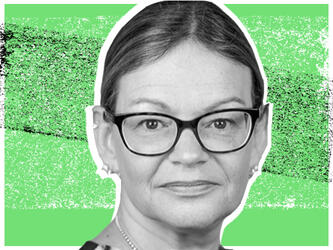The business of data

Jane Frost, CEO, MRS: It is timely to have this discussion because there has been more interest in regulating social media sites and more pressure on them to do more internal self-management. Is there a paradigm that is professionalised management with a very strong code of ethics? Would that be a better way of improving on these continuous crises of ethics and management hitting social media?
Nick Baker, UK CEO, Savanta: Is the dilemma that they aren’t geographically tied and a lot of regulation – where it works best – is in a national context?
JF: I cannot see anti-trust coming in against social media companies. I think it’s too big, and the other problem is that big data relies on it being global and at scale.
Jake Steadman, senior director, Twitter: It’s a global debate, but brand trust can still be eroded at an individual market level.
Tim Britton, managing director, open research group, Springer Nature: I don’t understand the distinction between ethics regulations and ethical breaches under a set of regulatory rules – one merges into the other. Needing training within ethics strikes me as a bit odd – you try to do the right thing. If you know what the principles are, you try to follow them; if you work within a regulatory environment, you must work within the rules. Is the question: ‘How is this to be governed?’ Or is it: ‘Is there good or bad in it, should it be allowed?’
NB: This is an issue for any multinational dealing with data on a massive scale. This is about market research or social research using data well.
JS: This debate gets framed by the media on a few large companies. Demos’ Carl Miller has an interesting point on this. The debate is broader than it gets filtered through in the media where they need a household name to target.
NB: A code of ethics will have to sit alongside a regulatory framework. Those things are going to exist in different places, but the ethical bit potentially becomes one of the core mechanisms for rebuilding trust. If you can demonstrate that, then you’ll get more permission to do stuff with data.
JS: I agree, it’s transparency, and following through and doing what you say you’re going to do.
TB: It’s an interesting point around being demonstrably and believably ethical, because I suspect the reaction from many consumers would just be: ‘Yes, they say that, but they do whatever they want with our data’. So, if there was a simple ethical framework that people believed – that could be helpful.
JF: Is it government regulation such as GDPR? Do you need to put something into corporate governance codes like Sarbanes-Oxley where it’s the duty of the board to ensure there is appropriate management in place?
JS: Twitter’s been clear that we think there is a different route, a more realistic self-regulation, radical transparency route.
TB: Regulation is going to happen. How effective it can be remains to be seen. It’s far from a perfect implement – it doesn’t do the whole job – but that doesn’t mean it isn’t necessary. We must be careful when industries say, self-regulation is better – it is interpreted as: ‘You don’t want to be properly regulated’. We should have a clear approach to an ethical use of data, which may involve statements in broad practices, or maybe it becomes part of annual reports. More companies are putting their data assets on balance sheets. The management and value of data is becoming more reported.
JS: There’s an important distinction; we’re talking about data regulation not wider social media. In that context, I wonder whether people have enough knowledge to know what’s good or not.
TB: That’s fair, it comes back to the distinction between regulation and ethical principles – I think regulation can potentially deal with those points.
JS: I can see a traffic light system [working] but who does that have to get applied to? Every company owns data, so at what point does a company have to report that? Is it fair to judge large multinationals by the same standard as a two-person start-up?
TB: Companies choose to sign up to it, so if you are a two-person start-up that wants to do everything properly, you sign up to the principles. If you don’t, suppliers can decide whether they’re willing to do business with you or not.
JF: A lot of this was the principle under which we established FairData – it ought to be something that consumers can recognise easily, and it should be a general stamp of approval about how you’re managing personal data.
JS: I’d imagine there is a nervousness about what the organisation can control versus what it will be given responsibility for from a data analysis point of view. A lot of times the analysis is done by third parties, not the company that created the data.
JF: A small number of very large companies are becoming, by the force of the data and the scale of what they do, super-national entities, probably more powerful than any individual nation state. That’s geodemographic development.
TB: If we’re not all willing to stand up and say, ‘this is important, we need to do something’, then whose job is it? It’s easy to throw our hands up in the air and say it’s all a bit too hard. I think we must be clear that we’re welcoming regulation, that there are ethical principles to which we work.
JF: As a sector, we live or die by the trust that people have in giving us resonant information. We ought to be slightly proud that previous generations of the MRS had tougher ethical standards for using data in research – like our children’s guidelines – than advertising had. They only caught up to us 11 years after we’d started laying down the law about when you could regard a child as an adult.
TB: It’s assumed that individuals give data away, corporations benefit financially and there’s nothing in it for the individual. That just isn’t true. Organisations are finding out what services make life better for the group of consumers involved, or society. I’m not saying bad is never done, but good is often done.
I get really nervous of saying you have to specify exactly how you’re going to use the data because, actually, it’s the data I collected three years ago that I suddenly realised – if I put it with the data I’ve got now – I can do this amazing new thing for this group of people, that I had no idea was going to happen at the time.
JF: So, I think we’re saying that there’s a lot to be learned from research because of what we’ve been doing; it has bolstered our business rather than detracted from it. We, as people with skin in the game of trust and transparency in data, feel that we do have a role in recognising where other people are doing it well in the wider world.
This article was first published in Impact.

We hope you enjoyed this article.
Research Live is published by MRS.
The Market Research Society (MRS) exists to promote and protect the research sector, showcasing how research delivers impact for businesses and government.
Members of MRS enjoy many benefits including tailoured policy guidance, discounts on training and conferences, and access to member-only content.
For example, there's an archive of winning case studies from over a decade of MRS Awards.
Find out more about the benefits of joining MRS here.












0 Comments